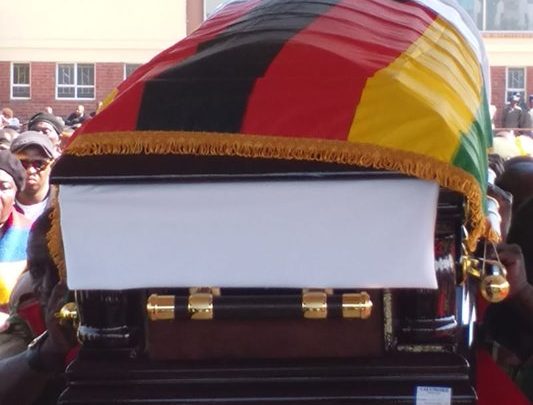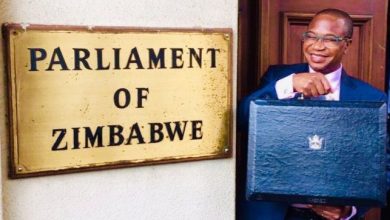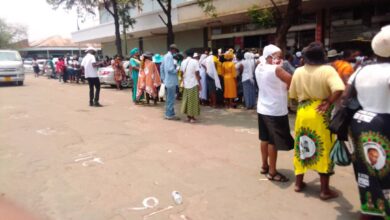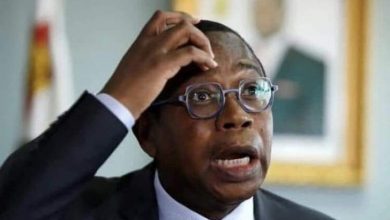Befitting farewell for Dabengwa

BY LULU BRENDA HARRIS
Thousands of Bulawayo residents thronged the White City Stadium to pay their last respects to national hero, Dr Dumiso Dabengwa, with various speakers speaking candidly about his inimitable contribution to the liberation of the country.
The various speakers from family members and colleagues who fought by his side in the liberation struggle, spoke truth to power, criticising the Zanu PF government for tormenting the national hero and running down the country, which Dabengwa gave his entire life to liberate.
Their eulogies, epitomised Dabengwa`s character, as he was a man who was not afraid to speak his mind.
Some of the prominent personalities who attended the memorial service included Zimbabwe Defence Forces commander General Phillip Valerio Sibanda, prisons boss Commissioner General Paradzai Zimondi and Industry minister Mangaliso Ndlovu.
MDC president Nelson Chamisa who led a powerful delegation from the opposition party was also present together with Ndebele King Bulelani Khumalo.
Chamisa was involved in a brief scuffle with security officials who barred him from taking a seat in the VIP tent and he ended up seating in another tent.
As Dabengwa’s body lay in a casket, draped with the Zimbabwean flag at the centre of the stadium, those who spoke from the podium concurred that Dabengwa had lived an honest and principled life until his last day on earth.
Proceedings started from the Nyaradzo parlour in Donnington before the motorcade drove through the city centre with hundreds of people lining up the streets to honour their hero.
At White City, the mood was emotive as people expressed their sadness of losing the ‘Black Russian.’
Listening to all the speakers, one deduced that Dabengwa’s memorial service was a time for truth telling, as the speakers pointed out that the country`s leadership should be able to rise above hatred, intolerance, tribalism and revenge, as these vices had destroyed one of Africa’s finest jewel.
Speaker after speaker spoke how Dabengwa had fought for justice, reconciliation and peace but these concepts remained elusive for Zimbabweans under the respective governments.
His widow, Zodwa when introduced to the masses, greeted the crowd by ZAPU’s famous slogan, “Zhi” and the people went wild with cheers.
The first speaker was his young brother, Sjabuliso who after introducing Dabengwa’s siblings and children recounted how the hero was worried by the oppressive white rule, which motivated him to partake in the liberation struggle.
“One time he was arrested at Grey Prison for saying ‘this government is rotten.’ After independence when he was at Chikurubi prison I asked him when he was likely to be released, he responded, ‘I don’t know because they said If I don’t join Zanu I won’t come out of prison,” narrated the brother.
A letter from his Russian compatriots was also read which described him as a man of courage, a real friend to Russia and his death was also a loss to the Soviet country.
One of his friends, Austin Reggies said Dabengwa had shaped his life not as an individual but as a citizen conscious of nationhood, which was the story told by most people who had interacted with him.
His cousin, Mtshana Ncube, said it was amazing how despite difficulties of the liberation war, Dabengwa had remained focused and positive.
He also said the title Black Russian was not as innocent as it sounded as it was a label assigned to him by western countries who did not want ZAPU to take power after independence, as it was a communist party, having received training from Russia.
Jeremy Brickhill, a former ZAPU intelligence officer who served in the National Standing Order (NSO) directly under Dabengwa said he was a soldier of peace who fought against racism, tribalism and pushed for unity.
Brickhill was accompanied by one of his sons, Dumiso, whom he named after Dabengwa.
Dr Dumiso Dabengwa Foundation director, Mthulisi Hanana almost stole the show with his brutal but provocative speech.
He said during the planning stages of the foundation, Dabengwa told him ‘many had in the past come to him and indicated that they wanted to do something for him only to disappear.’
“It was the story of his life. People disappeared on him often only appeared when they needed to benefit from him. Make false promises and disappear again,” he said.
Hanana also had a message to the authorities and told them Dabengwa stole nothing from the government and those who called him a sellout, were to take a good look at his mortal remains, see whether his face was indeed of a sellout.
As he was ending his speech, Hanana told Dabengwa that in his next life, he must:
“Tell Josiah Tongogara and Solomon Mujuru that the army now assists in political transitions and now shoots at civilians. Tell Lookout Masuku that his killers have not faced justice. Tell the victims of Gukurahundi that acknowledgement and apology have not come 30 years on. Tell Thenjiwe Lesabe that she is a National heroine…”
After this speech, Hanana was applauded but he having lost a mentor, wept inconsolably.
ZAPU Acting president Isaac Mabuka said Dabengwa’s death was yet another chapter in the struggle for self-determination that the country was embroiled in.
“Dabengwa strived to achieve inclusivity in the solution to the problems faced by this country. Problems caused by the systems that he fought against both before and after independence. Because of his principles and steadfast belief in the ideals of nationalism Dabengwa was not a bitter man.
“In the face of betrayal by his erstwhile colleagues he fought bravely for those principles. Dabengwa did not lose hope and faith in the founding principles and fundamentals of ZAPU. Those fundamentals are self-determination through Devolution and a voice for every section of the country through Proportional Representation,” he said.
Out in full force were former Zipra veterans, who through their secretary general, Baster Magwizi demanded that government return their war records, seized in 1982 detailing the guerilla movement’s participation and co operation with other regional organisations in liberating Southern Africa.
Retired Major General Jackie Refiloe Sedibe who was part of Umkhonto we Sizwe in South Africa, described Dabengwa’s contribution in the fight for the people’s liberation and selflessly sacrificed his time to make sure that people lived as equals, a struggle that continues.
As the body viewing was underway, Deborah Fraser’s song ‘Akekho Ofana Nawe’ was playing in the background, a reminder to people that the ‘deceptively quiet, no status seeker, humble but brave and disciplined man’ who had left a positive mark in Zimbabwe’s history was no more.
Dabengwa will be laid to rest at his rural home, Ntabazinduna, on Saturday.






